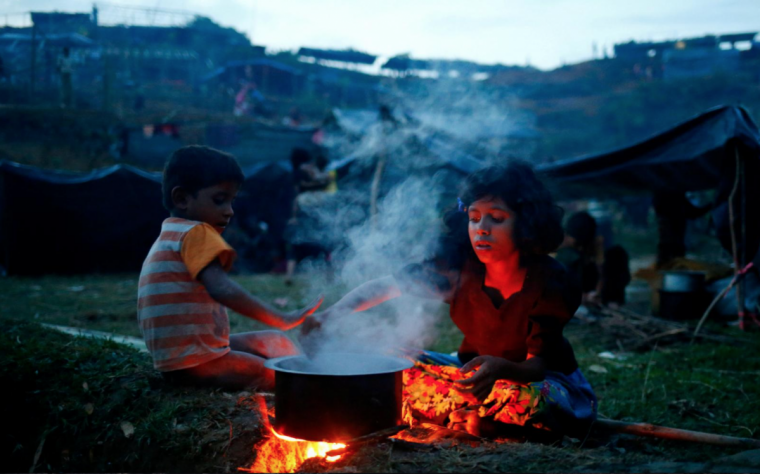Myanmar a 'textbook example of ethnic cleansing', warns UN
Myanmar's abuses against Rohingya Muslims amount to a 'textbook example of ethnic cleansing', a senior UN human rights officials said on Monday.
In one of the most forthright condemnations of Aung San Suu Kyi and her army's treatment of the minority group, Zeid Ra'ad al-Hussein told the United Nation's human rights council the attacks were 'clearly disproportionate' to militants' actions last month.

A newly formed group, Arakan Rohingya Salvation Army (ARSA), targeted a police outpost in August, killing nine and triggering a catastrophic crackdown.
More than 310,000 people have fled across the border into Bangladesh in less than three weeks with many more trapped on the border amid accusations of landmines being planted to stop their escape.
'I call on the government to end its current cruel military operation, with accountability for all violations that have occurred, and to reverse the pattern of severe and widespread discrimination against the Rohingya population,' Zeid said.
'Because Myanmar has refused access to human rights investigators the current situation cannot yet be fully assessed, but the situation seems a textbook example of ethnic cleansing.'
Aung San Suu Kyi vociferously denied the military's actions amounted to ethnic cleansing.
The conflict centres around 1.1million Rohingya, a minority ethnic group who are largely Muslim. They are denied citizenship in Myanmar despite having roots that go back centuries. Considered the most persecuted group in the group, the largely Buddhist Burmese ethnicity has targeted them for decades.
On Sunday the Dalai Lama, spoke out about the crisis for the first time, urging those attacking Rohingya to 'remember Buddha'.
'Those people who are sort of harassing some Muslims, they should remember Buddha,' he told journalists. 'He would definitely give help to those poor Muslims. So still I feel that. So very sad.'
He becomes the latest Nobel laureate to speak out against the conflict after Archbishop Desmond Tutu broke his vow of silence to urge Myanmar's de facto leader Aung San Suu Kyi to do the same.
In a heartfelt open letter to Myanmar's de facto leader, the 85-year-old described her as a 'dearly beloved sister' but said the 'unfolding horror' and 'ethnic cleansing' ongoing in the country's Rakhine State forced him to speak out.
'I am now elderly, decrepit and formally retired, but breaking my vow to remain silent on public affairs out of profound sadness,' he wrote.
'For years I had a photograph of you on my desk to remind me of the injustice and sacrifice you endured out of your love and commitment for Myanmar's people. You symbolised righteousness,' he said, posting the letter on social media.
'Your emergence into public life allayed our concerns about violence being perpetrated against members of the Rohingya. But what some have called "ethnic cleansing" and others "a slow genocide" has persisted – and recently accelerated.'
Tutu went on: 'If the political price of your ascension to the highest office in Myanmar is your silence, the price is surely too steep.'











